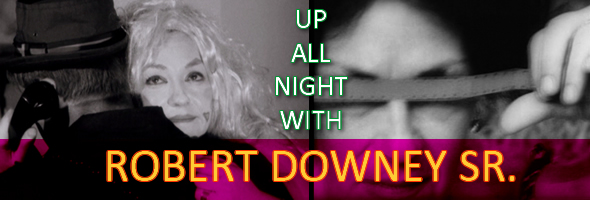
CHAFED ELBOWS NO MORE EXCUSES PUTNEY SWOPE TWO TONS OF TURQUOISE TO TAOS TONIGHT
BABO 73
B&W/Color, 1964, 56m.
Directed by Robert Downey
Starring Taylor Mead, James Antonio, James Greene, Tom Gaines
B&W/Color, 1966, 58m.
Directed by Robert Downey
Starring George Morgan, Elsie Downey
B&W, 1968, 46m.
Directed by Robert Downey
Starring Robert Downey, Alan Abel, Lawrence Wolf, Linda Disen
B&W/Color, 1969, 85m.
Directed by Robert Downey
Starring Arnold Johnson, Laura Greene, Allen Garfield, Buddy Butler, Antonio Fargas
B&W, 1975, 56m.
Directed by Robert Downey
Starring
Elsie Downey
Criterion (DVD) (US R1 NTSC) / Full Frame/WS (1.78:1) (16:9)
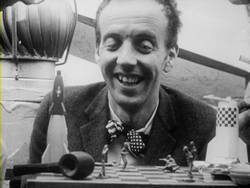 One of the key underground filmmakers from the late '60s and early '70s and one of the very few to actually "make it big," Robert Downey (now knowns as Robert Downey Sr. thanks to his famous actor son) is a cinematic force still difficult to categorize. His raucous, often plotless satires of cultural attitudes about politics, race, sex, marketing, sports,
One of the key underground filmmakers from the late '60s and early '70s and one of the very few to actually "make it big," Robert Downey (now knowns as Robert Downey Sr. thanks to his famous actor son) is a cinematic force still difficult to categorize. His raucous, often plotless satires of cultural attitudes about politics, race, sex, marketing, sports, 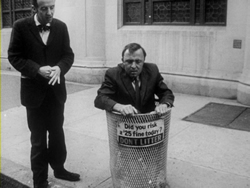 and religion, among other topics, often play like random colletions of sketches ultimately painting a portrait of an unjust world where the haves and have-nots are constantly at war. His real golden period lasted from his first (sort of) feature, Babo 73, until the little-seen "work in progress" from 1975 that closes out this set; as such, this Eclipse collection is a valuable preservation of five key titles from this period that will delight and befuddle plenty of new viewers.
and religion, among other topics, often play like random colletions of sketches ultimately painting a portrait of an unjust world where the haves and have-nots are constantly at war. His real golden period lasted from his first (sort of) feature, Babo 73, until the little-seen "work in progress" from 1975 that closes out this set; as such, this Eclipse collection is a valuable preservation of five key titles from this period that will delight and befuddle plenty of new viewers.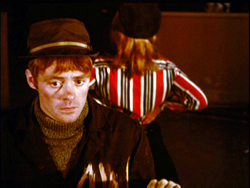 Downey's next self-penned film, Chafed Elbows, is one of the key New York counterculture films, though oddly it's been much easier to read about than actually see for the past few decades. Downey's wife at the time, Elsie, plays all the female parts including the mother/lover of Walter Dismore (Morgan), a Greenwich Village resident who wanders throu
Downey's next self-penned film, Chafed Elbows, is one of the key New York counterculture films, though oddly it's been much easier to read about than actually see for the past few decades. Downey's wife at the time, Elsie, plays all the female parts including the mother/lover of Walter Dismore (Morgan), a Greenwich Village resident who wanders throu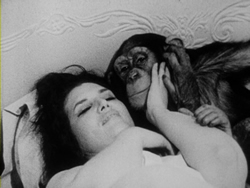 gh a motley crew of lunatics, briefly dies, gives birth to a wad of cash, and finds happiness in the strangest of places. Constructured in large part through still images intercut with random bits of live action and another bit of color footage for surreal effect, it's a witty and sometimes still-shocking film complete with some hilarious one-liners that will stick in your head long after viewing. Not for all tastes to be sure but pretty amazing if you're in the right frame of mind, this became one of the earliest significant counterculture films from the period alongside Andy Warhol's The Chelsea Girls the same year. This one's much shorter and definitel;y funnier.
gh a motley crew of lunatics, briefly dies, gives birth to a wad of cash, and finds happiness in the strangest of places. Constructured in large part through still images intercut with random bits of live action and another bit of color footage for surreal effect, it's a witty and sometimes still-shocking film complete with some hilarious one-liners that will stick in your head long after viewing. Not for all tastes to be sure but pretty amazing if you're in the right frame of mind, this became one of the earliest significant counterculture films from the period alongside Andy Warhol's The Chelsea Girls the same year. This one's much shorter and definitel;y funnier.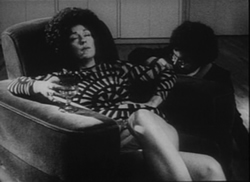 After the success of that film, Downey went on to helm the terrific and still underappreciated Greaser's Palace and the bizarre human-as-canines satire Pound (which is sadly still being held hostage in the MGM vaults), along with the controversial and impossible to see Sticks and Stones for CBS. He wound up closing out the decade with a two-year project originally entitled Moment by Moment, included as the final title in this set in its final approved form as Two Tons of Turquoise to Taos Tonight. Funded with the aid of such disparate pals as Hal Ashby and Jack Nicholson, this was sort of an ongoing work in progress screened in a few venues with running times ranging anywhere from just under an hour to 85 minutes. The one here is on the shorter side, jettisoning a lengthy voiceover opening among other tangents, and it's easily the most challenging title in Downey's filmography. As with Chafed Elbows, Elsie Downey plays all the women -- but this time it's about 20 different roles scattered through a disorienting hodgepodge of blackout sketches, random jokes, incomplete vignettes, and other odds and ends. From a baseball game played on horseback to a weird gag in which she feeds her panties to a hungry admirer, it's definitely Downey at his most fragmented and unorthodox. Also noteworthy is the intriguing soundtrack featuring the likes of David Sanborn, Jack Nitzsche, and Arica. After this Downey's career became a series of "huh?" moments including such quasi-mainstream blips as the comedy Up the Academy, the frothy Rented Lips and Too Much Sun (with Downey Jr. in the biggest roles he ever played for his dad), the Alyssa Milano vehicle Hugo Pool, and the rather good documentary Rittenhouse Square.
After the success of that film, Downey went on to helm the terrific and still underappreciated Greaser's Palace and the bizarre human-as-canines satire Pound (which is sadly still being held hostage in the MGM vaults), along with the controversial and impossible to see Sticks and Stones for CBS. He wound up closing out the decade with a two-year project originally entitled Moment by Moment, included as the final title in this set in its final approved form as Two Tons of Turquoise to Taos Tonight. Funded with the aid of such disparate pals as Hal Ashby and Jack Nicholson, this was sort of an ongoing work in progress screened in a few venues with running times ranging anywhere from just under an hour to 85 minutes. The one here is on the shorter side, jettisoning a lengthy voiceover opening among other tangents, and it's easily the most challenging title in Downey's filmography. As with Chafed Elbows, Elsie Downey plays all the women -- but this time it's about 20 different roles scattered through a disorienting hodgepodge of blackout sketches, random jokes, incomplete vignettes, and other odds and ends. From a baseball game played on horseback to a weird gag in which she feeds her panties to a hungry admirer, it's definitely Downey at his most fragmented and unorthodox. Also noteworthy is the intriguing soundtrack featuring the likes of David Sanborn, Jack Nitzsche, and Arica. After this Downey's career became a series of "huh?" moments including such quasi-mainstream blips as the comedy Up the Academy, the frothy Rented Lips and Too Much Sun (with Downey Jr. in the biggest roles he ever played for his dad), the Alyssa Milano vehicle Hugo Pool, and the rather good documentary Rittenhouse Square.